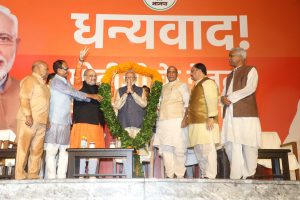 BJP led NDA achieved a historic win following marathon seven-phase national elections wherein more than 8,000 candidates from more than 2293 political parties contested to grab 543 seats of the lower house of India’s parliament. The second successive swearing in of BJP led NDA government marks the commencement of the second term of Narendra Damodardas Modi as Prime Minister of India.
BJP led NDA achieved a historic win following marathon seven-phase national elections wherein more than 8,000 candidates from more than 2293 political parties contested to grab 543 seats of the lower house of India’s parliament. The second successive swearing in of BJP led NDA government marks the commencement of the second term of Narendra Damodardas Modi as Prime Minister of India.
Genuine political courage is rare, but, it’s not impossible to find. Modi led NDA government coming back to power with a huge majority despite profound discontent among a significant section of people is reflective of sheer political strategy born out of political courage. The political strategy that never allowed issues like grand demonetisation gamble, unemployment, poor GST implementation, declining domestic investment and deepening agricultural crisis to become election issues at all. Instead, BJP was bold enough to encourage voters to think for themselves by outlining a cogent, serious and substantive plan for strong India. Also, the narrative built around fighting terrorism and Modi persona paid rich dividends. After all, in an interesting political culture-wars shift, deflecting attention on real issues is also part of the provocative political canvassing.
The majority of the world’s strongest democracies and affluent nations are mostly transparent countries having open business and government practices, high levels of trustworthiness and low levels of perceived corruption. Their mantra has been ‘the higher the standards of governance, the faster the development’.
India, a developing country, could well be the world’s largest democracy and one of the fastest growing economies in the world but it is neither one of the strongest democracies nor affluent nations.
In an era of democratic recession, electoral politics breeds opportunism and political opportunism begets political opportunism. Elections being winner-take-all, political parties’ only aim is to win and to do so by any means is always tempting. There are two key negative takeaways of the 2019 general election – low political discourse and criminal charges against 233 newly-elected MPs or 43% of total Loksabha MPs. On our part, we also failed to appreciate fully democracy’s purpose, process, and outcomes as we got stuck in the vortex of pro-Modi or against-Modi emotion. Put another way, we failed to rise above “isms” by not allowing deserving candidates win in many parliamentary constituencies or using NOTA to reject all unworthy candidates.
In present-day India, where relations between citizens and government are reshaping, the notion of “governance”, which refers to a mutual communication between the government and citizens, has become more intricate and intense. It’s precisely for this reason political pundit as also so called Khan Market gang failed to recognize the undercurrent in favour of Modi government in this year general election. In any case, it’s the majority who choose Modi government convinced by the good work done by the central government in the last five years. One may however argue whether Modi government in true sense adhered to “good governance” concept, which includes all the necessary principles for a democratic governance structure such as participation, transparency, accountability, effectiveness, rightness, fairness and human rights.
Looking ahead
It’s time now is for the new government to get down to the business. It’s time now to align with ideas and thoughts of aspirational India and country’s aspirational ethos. The India that didn’t get swayed by dynastic politics and caste based politics, is also unlikely to accept political deception and abuse of power any further. Thus, the central government’s ability to meet the next generation’s aspirations is crucial in taking the country forward.
The new government has its task cut out – preserving foundations of democracy and ensuring justice for all citizens regardless of social status, economic power or political leverage – these are the sacrosanct elements of democracy and certainly the bedrock of participatory governance.
Modi’s style of governance and management of the economy has been big talking points. Only time will tell up to what extent the innovative mega missions or policy measures taken during NDA 1 have fructified to the benefit of people. However, people are anxiously looking for several dynamic policy measures including long-standing reforms, but the single most important area is the economy that requires urgent attention and sustenance.
In all fairness, people’s expectations from a democratic government can only be actualised when there are matching efforts on both sides. If the government is found sincere in its functioning, the people should also engage in re-awakening exercise (to be responsible citizen) making both sides appreciate their roles in a democratic setting.
People’s expectations may be high or low depending on the confidence the people have in their government they have voted into power. Since NDA 2 has come to office with massive votes and high number of popular votes, such a government is expected to perform at an optimum level.
Sabka saath, sabka vikas along with newly coined sabka vishwas is nothing but progressive governance leading to progressive politics.
And, effective progressive politics is, and has always been –
About voices as well as votes
About identity as well as ideals
And about listening as well as leading.
letters@tehelka.com












